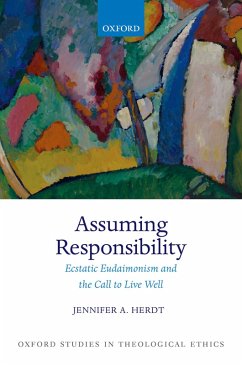Recent decades have witnessed an enthusiastic retrieval of eudaimonism, according to which the virtuous life is the happy life. But the critique launched by Kant - that eudaimonism is egoistic and distorts the character of duty or obligation - has persisted. Should I develop the virtues because these are the traits I need in order to flourish? Is it facts about my own happiness that determine my obligations to others? In this book, Jennifer Herdt deftly sifts through these debates, showing why we should embrace 'ecstatic' or 'goodness-prior' eudaimonism while rejecting 'welfare-prior' forms of eudaimonism. Grasping the character of ecstatic eudaimonism, she argues, has major implications, overcoming the common assumption of a sharp break between pagan and Christian eudaimonism, as well as of a late medieval or Protestant repudiation of eudaimonism in favor of divine command theory. Agents cannot rightly respond to the goods they encounter unless they respond to them precisely as good, and not merely as a means to promoting their own welfare; in responding well, their agency is thereby necessarily perfected. In conversation with vital strands of contemporary moral philosophy, Herdt goes on to articulate the distinctive character of obligation as a feature of accountability relations among agents. Assuming Responsibility offers a fresh point of departure for theological and philosophical approaches to virtue ethics, moral agency, and the contested relationship between the good and the right.
Dieser Download kann aus rechtlichen Gründen nur mit Rechnungsadresse in A, B, BG, CY, CZ, D, DK, EW, E, FIN, F, GR, HR, H, IRL, I, LT, L, LR, M, NL, PL, P, R, S, SLO, SK ausgeliefert werden.


